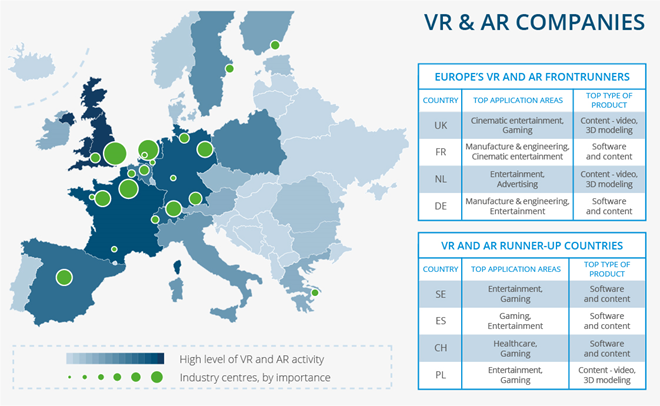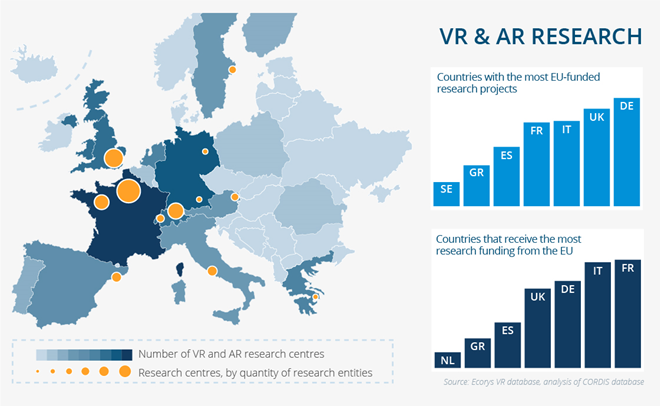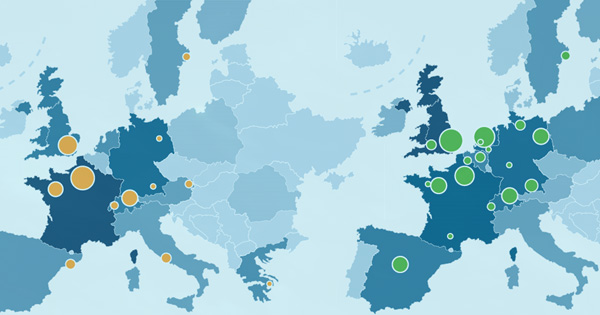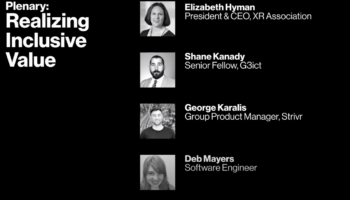VIRTUAL AND AUGMENTED REALITY SET TO CREATE UP TO 480,000 JOBS BY 2020
Europe is a strong and competitive hub for Virtual Reality (VR) and Augmented Reality (AR) technologies and is set to become global leader. That is the key finding of a recent study by European research firm Ecorys, which projects that by 2020 the production value of VR and AR will increase between €15 billion and €34 billion in Europe and create between 225,000 to 480,000 direct and indirect new jobs across the continent. Such a significant economic uplift would make Europe’s VR and AR market first-in-class.
The Ecorys study, commissioned by the Global Virtual Reality Association (GVRA), provides an in-depth snapshot of the state of play of the fast-changing VR and AR industry in Europe in 2016-2017. The study shows that Europe’s long-standing VR research and manufacturing, highly-skilled workforce, strong creative industry, and cultural diversity put the continent at a clear competitive advantage to seize the emerging VR opportunities and to become an important player in the global VR industry.
Within Europe, France, the UK, and Germany are clear frontrunners on VR and AR research projects, with R&D centers focusing on health care, the industrial use of VR, and general VR and AR advancement. Together with the Netherlands, these countries have the most VR and AR companies and activity. Sweden, Finland, Switzerland, Spain, Italy, and to a more limited extent Poland and the Czech Republic are gaining momentum and show increased VR/AR activity.


FROM RESEARCH TO APPLICATION
Europe’s VR and AR ecosystems are sustained by VR companies that create content, applications, and technologies, and are supported by highly specialized research hubs, such as ParisTech (FR) or the Technical University of Munich (DE). Europe is also an R&D center for VR software and specialized applications. Even non-European companies have decided to locate some R&D teams in Europe to benefit from the presence of highly-skilled workforce, and creating more jobs for these highly-skilled workers.
The VR and AR industry is developing across all application areas, ranging from industry to healthcare applications, from training and education to gaming and entertainment purposes. VR and AR have the potential to transform the way we learn, communicate, work, experience the world, and interact with each other. It can transform our economies by creating a new profitable industry which will benefit companies large and small.
POLICY OPPORTUNITIES AND CHALLENGES
A myriad of national and EU-level funding opportunities have fostered the development of Europe’s VR industry. For example, the European Commission’s Horizon2020 initiative, Digital Single Market initiatives to scale up internet access and connectivity, and the deployment of 5G networks.
However, the report also gathers policy recommendations from VR/AR stakeholders from different European countries, including academia, companies, incubators, associations, and specific industry experts. In doing so, it highlights certain existing challenges that should be addressed by policy makers to fully seize the opportunities of the VR industry for Europe’s economies and societies:
- The need for more funding schemes for VR/AR start-ups;
- Shortening funding application processes, and strengthened support for incubators and accelerators;
- Increasing funding for applied research and demonstrators, creating a stronger bridge between research and innovation;
- Developing educational and training programs aimed at developing practical VR applications, as well as training entrepreneurial skills;
- Supporting pan-European networking and collaboration in the VR industry, by funding events and supporting open-source software and tools;
- Helping to showcase success stories of VR across Europe.
“If this study shows one thing, it is that the VR/AR industry has only just begun to grow, and all of Europe’s stakeholders should join forces to build a favorable environment in Europe, unlocking the full benefit of these innovative technologies,” said Roelof-Jan Molemaker, Managing Director Ecorys Brussels.
ABOUT ECORYS
Ecorys is a leading international company providing research, consultancy, and management services. It specializes in economic, social, and spatial development and aims to deliver real benefit to society through its work. Founded in 1929, Ecorys is one of Europe’s oldest research and consulting companies, building upon the legacy of its former director and first Nobel prize winner in economics, Jan Tinbergen.
ABOUT GVRA
Promoting the worldwide growth and development of the VR industry, supported by Google, HTC VIVE, Facebook’s Oculus, Samsung, Sony Interactive Entertainment, and STARVR CORP., the GVRA’s mission is to promote responsible development and adoption of VR with best practices, dialogue across stakeholders, and research. GVRA is a resource for industry, consumers, and policymakers interested in VR.





